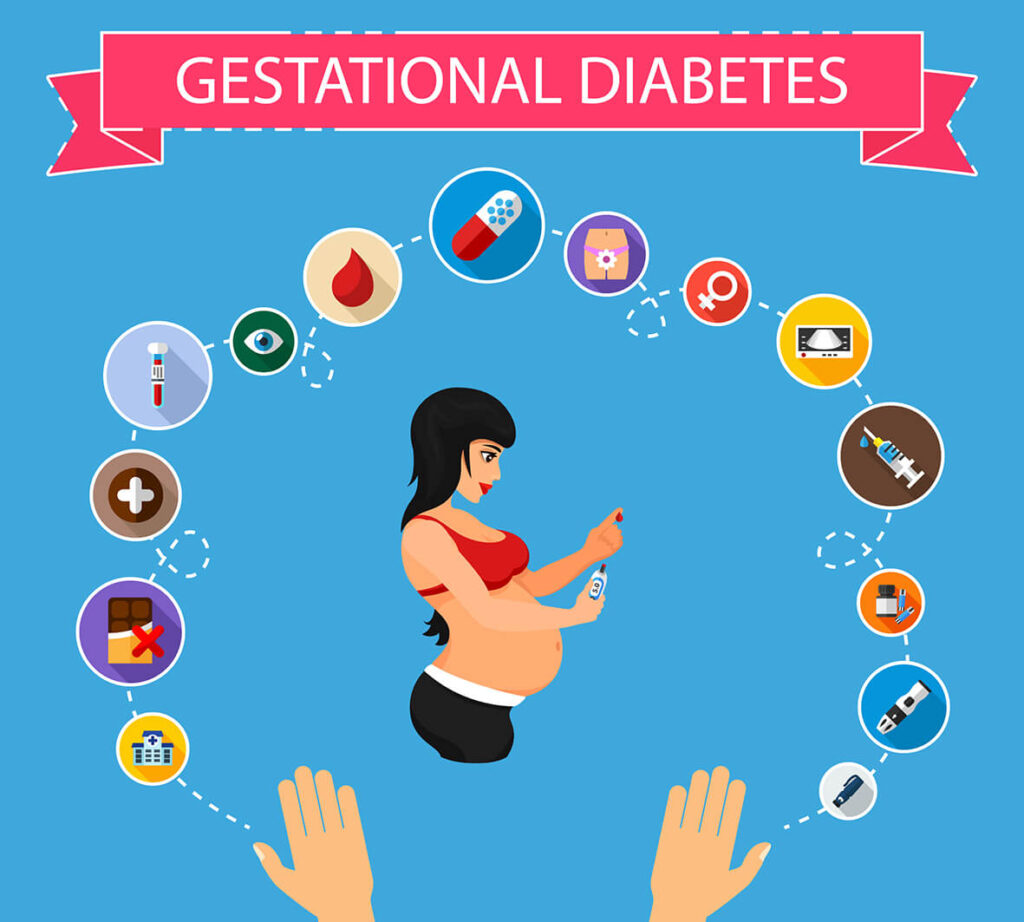How Hypertension Affects Insulin Sensitivity During Pregnancy?
- admin
- November 19, 2024
- 5:26 am
- No Comments

Pregnancy is a time of profound physiological changes, and among these, the interplay between hypertension and insulin sensitivity is particularly significant.
Understanding how hypertension influences insulin sensitivity during pregnancy is crucial for the health of both mother and child.
In this article, BestDietarySupplementforDiabetics will explore the mechanisms behind this relationship, examine the implications for maternal and fetal health, and discuss the importance of monitoring and managing these conditions during pregnancy.
Table of Contents:
- Introduction to Hypertension and Insulin Sensitivity in Pregnancy
- Physiological Changes in Pregnancy Affecting Insulin Sensitivity
- The Impact of Hypertension on Insulin Sensitivity
- Real-Life Example: Sarah’s Experience with Hypertension and Insulin Resistance
- Implications for Maternal and Fetal Health
- Monitoring and Management Strategies
- FAQs on Hypertension & Gestational Diabetes
- Conclusion
Introduction to Hypertension and Insulin Sensitivity in Pregnancy
Hypertension, or high blood pressure, and insulin sensitivity are interconnected factors that can significantly impact pregnancy outcomes.
Hypertension during pregnancy manifests in various forms, including chronic hypertension (pre-existing high blood pressure), gestational hypertension (developing after 20 weeks of pregnancy), and preeclampsia (hypertension with signs of organ damage).
Each poses unique risks for both mother and baby.
Insulin sensitivity, on the other hand, refers to the ability of the body’s cells to respond to insulin, the hormone responsible for regulating blood glucose levels.
During pregnancy, insulin sensitivity naturally decreases, particularly in the second and third trimesters. This change ensures an adequate glucose supply for the growing fetus.
Hormones such as human placental lactogen and cortisol play a role in this physiological insulin resistance.
In healthy pregnancies, the pancreas compensates by increasing insulin production.
However, the presence of hypertension can disrupt this balance.
Research published in the Journal of Hypertension highlights that hypertensive disorders in pregnancy are associated with greater insulin resistance.
The mechanisms likely involve systemic inflammation, endothelial dysfunction, and oxidative stress—common in hypertensive states—all of which impair insulin signaling pathways.
This combination can lead to elevated blood glucose levels, increasing the risk of gestational diabetes mellitus (GDM) and its associated complications, such as preterm birth and fetal macrosomia.
Understanding this complex interplay is critical for optimizing maternal and fetal outcomes.
Physiological Changes in Pregnancy Affecting Insulin Sensitivity
Pregnancy is a time of remarkable physiological adaptations, all designed to support the growth and development of the fetus.
One significant change is the natural decline in insulin sensitivity, especially during the second and third trimesters.
This adaptation ensures that sufficient glucose is available to the fetus, the primary energy source for its development.
Hormonal shifts play a key role in this process, with increased levels of hormones like human placental lactogen (hPL), progesterone, cortisol, and estradiol promoting insulin resistance in the mother.
hPL, secreted by the placenta, is particularly crucial.
It reduces maternal glucose uptake and increases blood glucose levels, prioritizing glucose delivery to the fetus.
Similarly, cortisol and progesterone amplify insulin resistance, while estradiol affects glucose metabolism by modulating insulin secretion.
In women with healthy pancreatic function, the body compensates for this decline in insulin sensitivity by increasing insulin production.
This adaptation helps maintain normal blood glucose levels, preventing hyperglycemia. For instance, consider Emma, a 30-year-old with no history of metabolic issues.
Despite her natural decline in insulin sensitivity during pregnancy, her pancreas responded by producing enough insulin, keeping her glucose levels stable throughout gestation.
However, in women with pre-existing metabolic challenges, such as obesity or polycystic ovary syndrome (PCOS), this compensation may be insufficient, leading to elevated blood glucose levels and an increased risk of gestational diabetes mellitus (GDM).
Understanding these hormonal changes is critical for identifying and managing potential complications in pregnancy.
The Impact of Hypertension on Insulin Sensitivity
Hypertension during pregnancy can significantly worsen the natural insulin resistance that develops to support fetal growth.
Studies have consistently shown that women with hypertensive disorders, such as preeclampsia, exhibit higher levels of insulin resistance than those with normal blood pressure.
The following factors explain this complex relationship:
- Endothelial Dysfunction: High blood pressure damages the endothelium (the inner lining of blood vessels), impairing its ability to produce nitric oxide. This reduces blood flow and affects insulin signaling, making cells less responsive to insulin.
- Inflammation: Hypertensive states often involve chronic low-grade inflammation, which disrupts insulin pathways by interfering with glucose uptake mechanisms in cells.
- Oxidative Stress: An imbalance between free radicals and antioxidants in hypertensive pregnancies can further impair insulin signaling. Oxidative stress damages cellular components, including those involved in insulin receptor activity.
- Elevated Blood Insulin and Glucose: As insulin resistance increases, the pancreas produces more insulin to compensate. This leads to higher circulating insulin and glucose levels, a hallmark of gestational diabetes.
For example, a pregnant woman with gestational hypertension may experience persistent hyperglycemia despite efforts to manage her diet, highlighting how hypertension amplifies insulin resistance’s impact during pregnancy.
Understanding these mechanisms is vital for effective management.
Emily’s Experience with Hypertension and Insulin Resistance
Meet Emily, a 34-year-old teacher in her second pregnancy.
During her first pregnancy, Emily was diagnosed with gestational hypertension, which led to complications in her third trimester.
She also developed mild gestational diabetes mellitus (GDM), requiring dietary adjustments and close monitoring.
Determined to avoid similar challenges, Emily prioritized a healthy lifestyle in her second pregnancy, focusing on balanced meals and regular exercise.
Despite her efforts, Emily’s blood pressure started to rise around her 24th week, and she was later diagnosed with preeclampsia.
Simultaneously, her glucose tolerance test revealed elevated blood sugar levels, indicative of heightened insulin resistance.
Her care team promptly adjusted her management plan, combining blood pressure medication with tighter glucose control.
Emily’s experience highlights how hypertension can exacerbate the natural insulin resistance of pregnancy, underscoring the importance of frequent monitoring, early intervention, and tailored care to ensure the health of both mother and baby.
Implications for Maternal and Fetal Health
The combination of hypertension and increased insulin resistance during pregnancy poses significant risks to both mother and baby.
For mothers, this can lead to a higher likelihood of developing type 2 diabetes after delivery, cardiovascular diseases, and metabolic syndrome.
For the fetus, potential complications include macrosomia (excessive birth weight), which can cause delivery challenges, preterm birth, and a greater risk of developing metabolic disorders such as obesity or diabetes later in life.
These interconnected risks make it essential to understand and manage the relationship between hypertension and insulin resistance to mitigate complications and improve outcomes for both mother and child.
Monitoring and Management Strategies
Proper monitoring and management of hypertension and insulin resistance during pregnancy are essential for the health of both mother and baby.
Regular prenatal visits should include routine blood pressure checks and glucose tolerance tests to identify potential abnormalities early.
Early detection allows for timely interventions, reducing the risk of complications such as preeclampsia or gestational diabetes mellitus (GDM).
Lifestyle interventions play a significant role in managing these conditions.
A balanced diet rich in whole grains, lean proteins, and fresh produce helps regulate blood sugar levels and control blood pressure.
Regular physical activity, such as walking or prenatal yoga, can enhance insulin sensitivity and improve cardiovascular health.
In some cases, lifestyle changes alone may not suffice, and medication may be required to manage hypertension or insulin resistance effectively.
Collaboration among healthcare providers—obstetricians, endocrinologists, and dietitians—is critical to developing an individualized care plan.
This multidisciplinary approach ensures that both conditions are managed holistically, minimizing risks and promoting a healthy pregnancy outcome.

FAQs on Hypertension & Gestational Diabetes
Q-1: How does hypertension biologically worsen insulin sensitivity during pregnancy?
A-1: High blood pressure ramps up vasoconstrictive and inflammatory signals that stiffen blood vessels and disrupt how they open during insulin-directed glucose uptake. Less capillary recruitment means less glucose delivered to working muscle. At the same time, stress hormones and inflammatory cytokines nudge the liver to release more glucose. Pregnancy already lowers insulin sensitivity; hypertension stacks additional vascular and inflammatory friction on top, raising insulin demand.
Q-2: Is the link specific to preeclampsia, or do gestational and chronic hypertension show insulin resistance too?
A-2: It is broader than preeclampsia. Women with gestational hypertension and those entering pregnancy with chronic hypertension often show higher fasting insulin, larger post-meal glucose excursions, or both—signs of reduced insulin sensitivity. Preeclampsia typically presents the strongest metabolic hit, but non-proteinuric hypertensive states still display measurable impairment compared with normotensive pregnancies.
Q-3: What adipokine patterns connect hypertensive pregnancy with insulin resistance?
A-3: Adipokines shift toward an insulin-resistant profile. Insulin-sensitizing signals (like adiponectin activity) tend to be lower or less effective, while pro-inflammatory cues are higher. That combination blunts muscle glucose uptake, encourages hepatic glucose output, and aggravates endothelial dysfunction. Clinically, you may see rising triglycerides, higher fasting insulin with normal or near-normal fasting glucose, and greater after-meal spikes.
Q-4: Do placental and vascular hormone systems that drive hypertension also erode insulin action?
A-4: Yes. Altered renin–angiotensin signaling and endothelial nitric-oxide pathways reduce microvascular flexibility and capillary surface area available for glucose exchange. Placental stress hormones further amplify hepatic glucose production. The practical result is fewer “on-ramps” for glucose to enter muscle and more “off-ramps” pushing glucose into the bloodstream—classic features of heightened insulin resistance in late gestation.
Q-5: Can blood-pressure treatment choices influence glycemic control during pregnancy?
A-5: Antihypertensives used in pregnancy are chosen for maternal and fetal safety first, but they can have small metabolic footprints. Beta-blockers may blunt adrenergic warnings of hypoglycemia in patients using insulin or secretagogues; calcium-channel blockers are generally metabolically neutral; centrally acting agents can modestly affect insulin needs in specific contexts. The key is coordinated care: select a BP regimen that controls pressure, monitor glucose trends closely, and adjust nutrition, activity, and therapy as needed.
Takeaway: Hypertension adds vascular stiffness and inflammatory noise to a metabolism already tuned toward insulin resistance in pregnancy. The combined effect is higher insulin demand, larger post-meal swings, and a lower margin for error—especially late in gestation. Early recognition, tight BP control, and proactive glucose monitoring help keep both mother and baby in the safe zone.
Conclusion
Hypertension can significantly affect insulin sensitivity during pregnancy, leading to increased risks for both mother and child.
Understanding this relationship is essential for healthcare providers and pregnant women to implement effective monitoring and management strategies.
By addressing these issues proactively, it is possible to improve pregnancy outcomes and promote long-term health for both mother and child.
References: